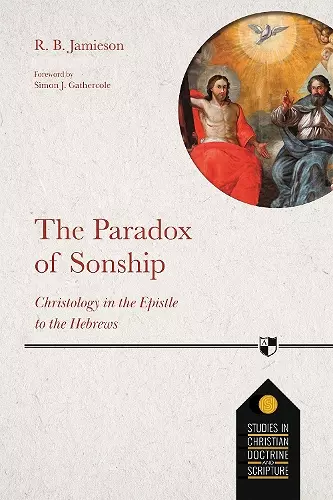The Paradox of Sonship
Christology in the Epistle to the Hebrews
Format:Paperback
Publisher:Inter-Varsity Press
Published:20th May '21
Should be back in stock very soon

Exploration of the divine sonship of Jesus in the New Testament letter to the Hebrews
The Studies in Christian Doctrine and Scripture (SCDS) series promotes fresh understandings of Christian belief through creative, faithful readings of the canonical text. -- What does the epistle to the Hebrews mean when it calls Jesus 'Son'? Is 'Son' a title that denotes his eternal identity in the one, triune God? Or is it a title given to Jesus in light of his unique role as the Messiah? In this volume, theologian and pastor Bobby Jamieson considers the complexity of the Christology presented in the epistle to the Hebrews. Exploring the paradox of the term, Jamieson argues that we should understand Jesus’ sonship in light of both his eternal existence as a distinct person of the triune God as well as the messianic office to which he is appointed. Jesus is, in short, the eternal Son who became the incarnate Son in order to fulfil the mission given to him by the Father.
Many have spoken of the need for and shape of theological exegesis. Rare is the work that actually employs theological wisdom for the sake of better exegetical practice. Now R. B. Jamieson's The Paradox of Sonship serves as a marvellous example. The work employs early christological concepts to keep alert to the breadth of teaching in Hebrews regarding the sonship of the Messiah. I highly commend it. * Michael Allen, John Dyer Trimble Professor of Systematic Theology at Reformed Theological Seminary *
The Paradox of Sonship illuminates the central christological conundrum of Hebrews by reading the book in dialogue with classical theological categories. Conventional academic practice has long warned against allowing doctrine and exegesis to make such close contact, but here Jamieson demonstrates the sweeping benefits of reuniting them. The drama, the tension, and even the sheer literary suspense of Hebrews come to life in dialogue with Nicene and Chalcedonian categories. I hope to see many more books that follow the path opened up here. * Fred Sanders, Torrey Honors College, Biola University *
The Christology of Hebrews, particularly what the author means in identifying Jesus as the Son, has long been debated. Jamieson argues that the earliest interpreters in church history had a simple and yet elegant explanation, which clarifies sonship language in Hebrews. Jamieson doesn't stop with the earliest interpreters or even begin with them. He maintains that these ancient readings accord with the historical meaning of Hebrews, that they match the intention of the author. Jamieson reminds us that our ancestors in the faith are indispensable sources for understanding New Testament authors. I found Jamieson's argument to be refreshing and convincing. Even those who disagree in some respects will find much here to stimulate their thinking. * Thomas R. Schreiner, author of Paul, Apostle of God's Glory in Christ and James Buchanan Harrison Professor of New Testament Interpretation at The Southern Baptist Theological Seminary *
ISBN: 9781789742848
Dimensions: unknown
Weight: 340g
224 pages